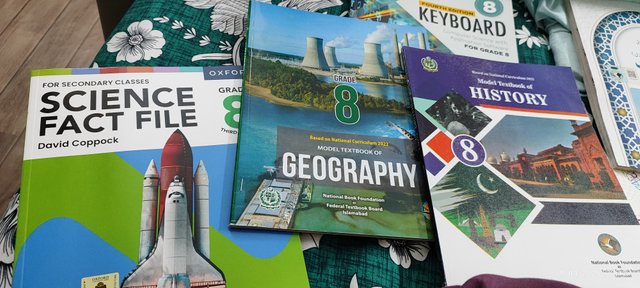Curriculum – a map or a maze?
Hold your horses… the rant begins now. Yeah, I have to talk about it before I can't hold it in any longer. So yes, bear with me. 😉😤
The new academic year has begun. With it, the usual shopping for books and notebooks for my children is done and dusted. According to the curriculum, of course. It's already the end of the week… and I’m still left stuck on this very word: What is this curriculum? A map or a maze???
New books, new session, but somehow, I’m not excited about them learning these course books. And why do I feet they aren't either!
Something doesn’t feel right. The learning part... There's isn't much enthusiasm. Or maybe I am overthinking...
What exactly is the purpose of curriculum or more pressingly: What exactly is a curriculum? A roadmap to learning? A list of must-knows? Or merely a system crafted to keep our schools functioning in a predictable way?
Of course you know the answer to these questions. At face value, curriculum is meant to guide learning. No? But often, it feels more like a checklist designed not with the learner in mind, but with the needs of institutions, assessments, and policies at its core.
Is it truly about learning… or about satisfying a framework someone else designed? At least here, in my part of the world, the latter is the case! At least in my opinion, and up to the intermediate level of the education system.
Who decides what we must learn, and why?
I used to question this even when I had no idea about this very word curriculum. I would sit and stare at my books and wonder: Why should I know about this specific topic and not something else.
I would always wonder:
If I have a deep passion for learning about trees, must I also be forced to learn about stars?
And if I want to be a painter, should I really be sweating over the life cycle of a frog? Maybe. I might have to draw it one day! ;)
Well, these are such stupid examples. I was never interested in trees, nor in painting in particular, but I still had questions like these in my mind.
Coming back to our original point: At what point do we stop building foundations and start letting learners shape their own paths? No, I didn’t have questions this advanced and mature at that time, but yes, this was the essence.
Sure, basic literacy and numeracy—those are non-negotiable. We need to function in society, solve everyday problems, understand the world around us to some extent.
But how much of our early education is truly basic, and how much is just padding—content carried over for decades because no one questioned its relevance?
Have you ever wondered: Why is there growing disinterest among students today?
Yes, platforms like Instagram have changed attention spans. Yes, dopamine-driven scrolling is a real challenge.
But the issue isn't just distraction—it's disengagement.
It's a system that hasn’t evolved to meet the curiosity, individuality, and fast-paced adaptability of this generation.
We're teaching with methods from the past, trying to reach minds shaped by the future.
A few years back, I came across the term Aptitude Learning, along with a comparison between it and the traditional curriculum. We had a long debate over this topic. And we didn't get anywhere... I mean what's the purpose even of discussing this. Do we have any power to change things?
In that discussion we repeatedly agreed on one point and that was about a dire need to distinguish between:
- What a child is capable of learning
- What they want or need to learn
This is such a basic requirement of learning. I would even say that in the past period the education was more aptitude based rather than in this modern age.
Aptitude-based learning respects a child's natural tendencies and interests, while the traditional curriculum often demands a one-size-fits-all approach. And that's so unfair!
Is it any wonder students start tuning out?
So, Where Do We Stand? (At least in Pakistan)
We are falling behind—not just in global rankings, but in fostering creativity, joy, and a lifelong love for learning.
Outdated curriculums and rigid structures are partly to blame.
We need:
- Flexibility
- Relevance
- Freedom
Because maybe… just maybe…
if someone had let us chase our curiosity about trees (remember my curiosity, what if I liked to learn about trees even though I don’t?), we might have grown deeper roots of knowledge, instead of drifting away in stars a cloud of meaningless facts. ¯_(ツ)_/¯
(There ain't any shrug emoji in Markdown? Just so you know, I'm shrugging my shoulder here) ¯_(ツ)_/¯
Ugh! Still not appearing right:


I asked this same question about relevance but in college.
Long before then, my Mom's Mom or Grandmother began to hand me books as gifts as a kid. For the most part the books were best seller list novels.
I think that is the best way to do it. From there, I branched out into the technical. The good news is that I learned a lot about a lot things and on high levels: the bad news is no one thinks I am qualified and can't get paid for it at the proper level.
Things like, The American Scientific Encyclopedia. Reading all of those, or most of them was a real eye-opener. But not qualified to do anything! Hah hah, haha!
So, I don't know what Pakistan is like but here it used to be one could set there own destiny by borrowing books at the library and reading them.
I believe this debate on curriculum can be quite lengthy. It’s multifaceted and multifactorial. Obviously, any qualification requires certain criteria, and a course is designed accordingly. I have no objection to that whatsoever. My only point in this long, probably futile debate is just one thing — what is the thought process behind designing the curriculum, especially, for lower grades? Here, we are teaching some topics that are so outdated, generation after generation, that their purpose doesn’t seem to be education at all... it just feels like the goal is to torment the children.
Children rarely take any real interest in such topics. Why aren't we imparting knowledge that aligns with the demands of the modern age? I believe it's high time we openly discussed platforms like Instagram and social media in schools. If we can’t keep our children away from them, then there should at least be a proper course on their use—covering both the positives and the negatives. We should talk about their algorithms. This should now be part of basic education.
Let's also talk about taxes! I still haven’t been able to understand the process of filing a tax return myself. (Unrelated: So many people ask my husband to do it for them—and he does it voluntarily). But why? Why hasn’t this ever been part of the basic school curriculum?
Why aren’t we teaching kids how to make an omelette, or the basic life skills they need to survive? Why is Home Economics treated like an optional subject? There should be at least three periods a week dedicated to it. Everyone should know how to do basic stitching.
So that’s the heart of my point… it feels like nothing’s going to change. In this fast-paced world, especially in Pakistan where grade 12 (FA/FSc) marks the start of career or professional education, there’s just no time left. We fill kids’ minds with half-baked, often useless information, and then expect them to pursue medicine, engineering, or whatever else—without equipping them with even the most basic life skills.
I can feel your pain. That’s exactly how these systems operate—only aligned with a fraction of the society’s mindset and needs.
You bring up some good points, especially about real skills, like cooking, shop classes, tax returns, checkbook or account balancing. More...most of these things were taught by parents or grandparents, uncles, aunts, older cousins, neighbors, friends. Modern Society, if it should be called "society" seems to remove interpersonal interactions from people. So the key is to interact!
Now I noticed you wrote about Eid...today was Palm Sunday, the day Jesus rode into Jerusalem upon a colt of an Ass and the people waved Palm fronds recognizing Him as King. And then there was the last supper. The betrayal by Judas of the twelve.
I have noticed the similarity between Islam(Eid), Christianity(Lent), and Judaism(Purim). Although as Jerry Seinfeld as Jewish comedian would say, "All you have to do as a Jew is not eat for one day and all your sins are forgiven. Christians pay retail for sin!" I guess Muslims do too.
No really, the dissolution of the family is insanity and total control by the state is what leads to slavery. Without families and religion, a terrible future might come upon the world.
So, interact and change the world.
Thanks @steemcurator01
It's also common in asian parents to force all of their children to go for science and become doctors, even if any one of their child wants to do computers.
I remember I didn't want to study science, biology in matric but my mother forced me to do it. Though i enjoyed it later on.
They had me to do experiments on me puri life in the first place. It was also just to fit perfectly in society.
In my extended family, there is another lady forcing her children to study science and they fail miserably. But she is not ready to experiment with other opportunities.
Above all, the school system is mass producing non-functional children for economy, myself included too(@mehwish-almas can relate).
Amina, why do I feel like you're a little upset with your elders... Though, we children aren't always that great either, are we? I think if we actually showed focus, interest, and dedication in something, maybe the elders wouldn’t keep drilling science into us all the time... Anyway, this thought came to me reflectively today because I saw it from the perspective of a parent for the first time... When kids are constantly glued to mobiles, laptops, and gadgets, then what else can one do? Naturally, we too end up pushing science, right?
My father used to say that science is necessary—at least until matric and FSc—so that a child’s mind opens up and they develop a habit of scientific thinking. So that they get used to hard work. I think that’s the right approach, because the kind of pointless things being taught in arts subjects nowadays—science is better than that, honestly. Anyway, look where this debate has ended up...
I agree with you... the mindset of us elders—since I suppose I am one now too.
And regarding the curriculum, I would quote here my reply to jeff again:
What do you say?